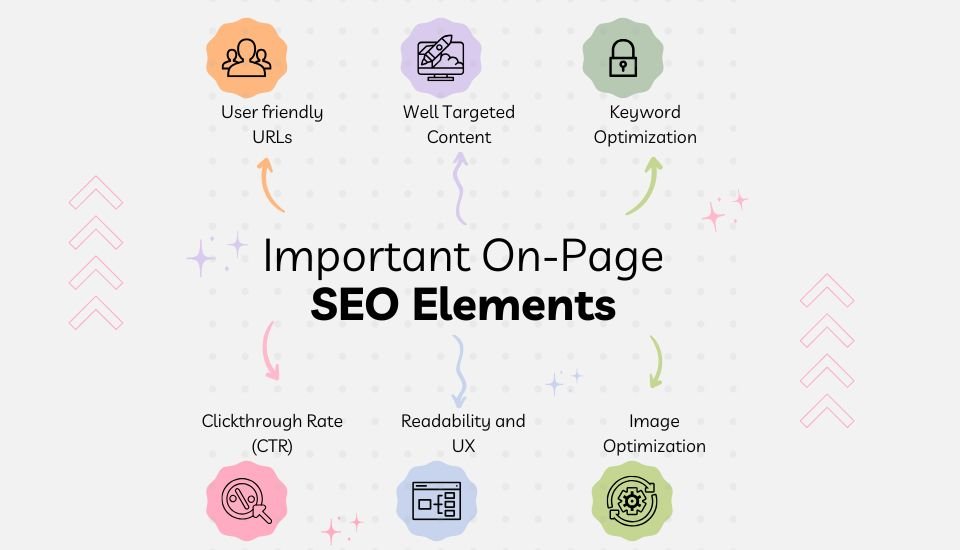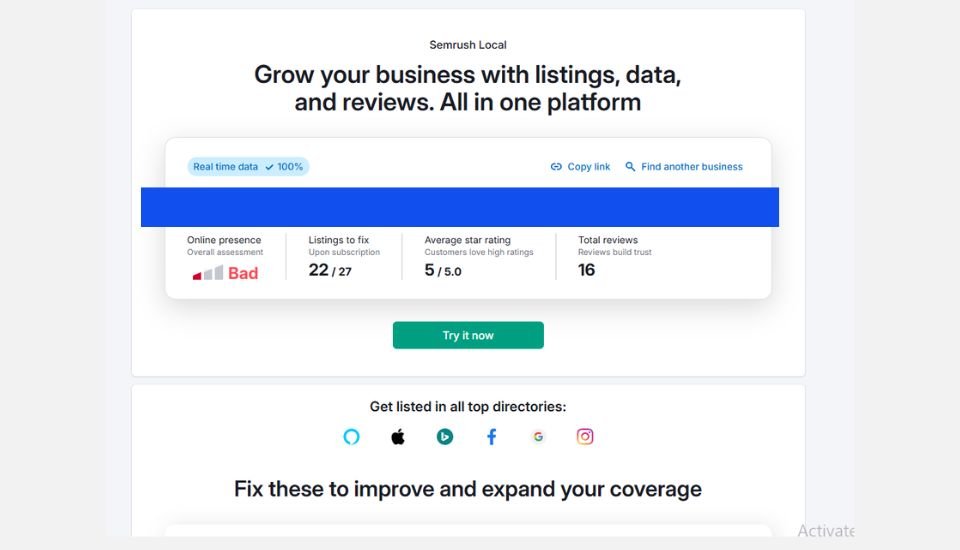At SpeedX Marketing, we are a leading provider of innovative IT solutions tailored to meet your specific business needs. With years of expertise and a team of skilled professionals, we offer cutting-edge technology solutions that drive growth and efficiency.

33.3 million businesses in the United States qualify as small businesses, making up 99.9% of all U.S. businesses. Additionally, 70-80% of people research a small business online before visiting or making a purchase. With such a vast number of small businesses and a high rate of online searches, it’s crucial for small businesses to capture potential clients. This can be achieved through Search Engine Optimization (SEO).
SEO is the key to making your business more visible, attracting more customers, and driving growth. By leveraging the power of SEO, small businesses can enhance their online presence, build brand credibility, and increase revenue. SEO involves a series of strategies and techniques designed to improve your website’s ranking on search engine results pages (SERPs) organically. Unlike paid advertising, SEO focuses on optimizing various aspects of your website and content to align with search engine algorithms, thereby boosting your chances of appearing prominently when potential customers search for products or services related to your business.

Implementing a robust SEO strategy offers several key advantages:
SEO helps your website rank higher in search engine results pages (SERPs), making it more likely for potential customers to discover your business when they search for related products or services.
Compared to traditional advertising methods, SEO can be a cost-effective strategy with a potentially high return on investment (ROI), especially for small businesses operating on limited budgets.
By targeting specific keywords relevant to your business, SEO helps attract visitors who are actively searching for what you offer, increasing the likelihood of conversion.
High-ranking websites are often perceived as more trustworthy by users. Effective SEO strategies can help establish your brand as an authority in your industry.
Unlike paid advertising, SEO efforts can continue to drive traffic and generate leads over time, even after you’ve stopped actively optimizing.
Now, let’s delve into practical SEO tips that small businesses can implement to improve their online presence:

For small businesses, a Google Business Profile is essential for boosting local SEO and attracting nearby customers. A study by Finances Online found that 72% of people who performed a local search visited a store within five miles of their location. Formerly known as Google My Business, this profile significantly enhances your business’s visibility in Google Maps and local search results. By completing your profile with accurate information—such as your address, phone number, and business hours—you make it easier for potential customers to find and trust your business. Encouraging customer reviews and regularly updating your profile with posts or offers can further improve your presence. Read below to learn how to register and optimize your Google Business Profile.
Setting up and optimizing your Google Business Profile (formerly Google My Business) is crucial for local SEO and improving your online presence. Here’s how to do it effectively:

Setting up Google Analytics and Google Search Console provides valuable insights into your website’s performance and search presence:
Google Analytics: Helps you track website traffic, user behavior, conversion rates, and other key metrics. Install Google Analytics by adding a tracking code to your website’s header or using a plugin if you’re using a content management system like WordPress. Once set up, you can monitor which marketing channels drive the most traffic and conversions.
Google Search Console: Formerly known as Google Webmaster Tools, this tool provides data and diagnostics directly from Google about your website’s presence in search results. It helps you monitor and resolve issues that may affect your site’s visibility, such as indexing errors, manual penalties, and search queries driving traffic to your site.
These tools are essential for monitoring and improving your website’s performance:
Keyword research involves identifying relevant search terms that potential customers use to find products or services similar to yours. Use tools like Google Keyword Planner or SEMrush to discover keywords with decent search volume and low competition. Incorporate these keywords naturally into your website content, including titles, headings, and meta descriptions. Keyword research forms the foundation of any successful SEO strategy.

Here’s how to approach it:
Once you have your list of keywords, integrate them naturally into your website content, including page titles, meta descriptions, headers, and throughout your website copy. Monitor their performance using analytics tools to refine your strategy over time.
This approach to keyword research will help small businesses attract targeted traffic and improve their visibility in search engine results pages (SERPs).
A well-organized site structure improves user experience (UX) and makes it easier for search engines to crawl and index your pages. Ensure your website has a clear hierarchy with intuitive navigation. Optimize URLs, use descriptive anchor text for internal links, and create XML sitemaps to facilitate crawling by search engines.

Some important aspects of Site Structure involved:
By reviewing and optimizing your site structure, you not only improve user navigation and engagement but also enhance your SEO by making it easier for search engines to crawl and index your content effectively. This foundational step sets the stage for other SEO efforts, helping your small business gain visibility online.
Analyzing your competitors’ presence in SERPs helps identify opportunities and gaps in your own SEO strategy. Study their content strategy, backlink profiles, and keyword usage. Look for ways to differentiate your offerings and improve upon what your competitors are doing.

Analyzing competitors in SERPs provides valuable insights to refine your SEO strategy and outrank them:
Implement structured data markup to enhance your website’s chances of appearing in rich snippets and other SERP features relevant to your industry.
Optimize crucial on-page elements like title tags, meta descriptions, headers (H1, H2, etc.), and URLs. Use relevant keywords naturally within these elements to improve search engine understanding and user engagement. Ensure each page has a unique meta description with a clear call-to-action to encourage clicks from search results.

Here’s a detailed explanation of the key on-page elements to optimize:
By optimizing on-page elements, small businesses can enhance their online presence, attract more local customers, and compete more effectively in their markets.

Develop valuable, customer-centric content that addresses common questions, concerns, and interests of your target audience. Content should be informative, engaging, and optimized for relevant keywords to attract organic traffic. Use blog posts or articles to provide tips, tutorials, and industry insights that demonstrate expertise and build trust with potential customers.
When creating content for your small business, consider these practical steps to foster connections with your audience:
Focusing on providing value through SEO and quality content creation, small businesses can effectively and ultimately grow their customer base.

Schema markup enhances the way search engines read and present your website in SERPs. It provides additional context to your content, such as reviews, ratings, and product details, making your listings more informative and visually appealing. Implement local business schema for small businesses to appear prominently in local search results, including address, phone number, and operating hours.
There are various types of schema markup that small businesses can use, such as local business schema, product schema, and review schema. By adding schema markup, you can enhance your search engine listings with rich snippets, which can increase click-through rates.
Schema Markup Improves click-through rates (CTR) by making your search results more attractive and informative. Enhanced visibility in search results can lead to more traffic and potential customers. For example, a small hotel using event schema can highlight upcoming events, attracting guests interested in local activities.
Conduct regular SEO audits to identify and resolve common technical issues that can affect your site’s performance and rankings. This includes checking for broken links, optimizing site speed, and ensuring mobile-friendliness. Utilize tools like Google Search Console and Screaming Frog to uncover and address indexing problems and crawl errors promptly. Identifying and resolving basic SEO issues is crucial for improving your website’s performance.

By focusing on these areas and consistently optimizing your website, small businesses can achieve sustainable growth through effective SEO practices.

Ensure your business is listed accurately on relevant online directories, review sites, and social platforms. Consistent NAP (Name, Address, Phone Number) information across all listings improves local SEO and helps potential customers find and contact your business easily. Practical detail: Claim and optimize your Google My Business profile with accurate business information, photos, and customer reviews to enhance local search visibility.
Creating and maintaining accurate and consistent online listings (citations) across various platforms is crucial for local SEO and overall visibility. Here’s how to do it effectively:
Creating relevant online listings, small businesses can enhance their online visibility, attract more targeted traffic, and ultimately, grow their customer base.

Encourage suppliers, partners, and local business associations to link back to your website. These inbound links not only drive referral traffic but also signal to search engines that your site is credible and relevant within your industry. Reach out to suppliers and business associations via email or during meetings. Offer to write guest posts or provide testimonials in exchange for a link back to your website. Ensure that the links are from reputable sites relevant to your business niche.
Backlinks (links from other websites to yours) are a crucial factor in SEO rankings. When reputable websites link to yours, search engines view your site as more authoritative and trustworthy, which can positively impact your rankings.
This strategy not only enhances your SEO but also increases your online visibility and credibility within your industry. It’s a mutually beneficial approach as it can also drive referral traffic from these partner websites to yours.

Maintain accurate and consistent information across local business directories such as Google My Business, Yelp, and Yellow Pages. Local SEO plays a critical role in attracting nearby customers who are searching for products or services similar to yours. Regularly audit your business information on these directories to ensure it’s up-to-date. Respond promptly to customer reviews and engage with local community events or sponsorships to enhance your local presence.
Local listings are crucial for small businesses targeting local customers. Here’s how to effectively monitor and manage them:
By focusing on these SEO tips and actively monitoring local listings, small businesses can improve their online visibility, attract more targeted traffic, and ultimately, increase their customer base and revenue.

Positive reviews not only build trust with potential customers but also signal credibility to search engines. Encourage satisfied customers to leave reviews on platforms like Google, Facebook, and industry-specific review sites. Implement a review management strategy that includes asking customers for feedback post-purchase or service. Respond to all reviews promptly, whether positive or negative, to show your commitment to customer satisfaction and improve your SEO.
Managing customer reviews effectively can boost your SEO and reputation:
By effectively managing customer reviews, small businesses can enhance their online visibility, attract more qualified traffic, and build a positive reputation in their target market.
Regularly monitor your keyword rankings and organic traffic using tools like Google Analytics and SEMrush. Tracking your performance helps you identify what’s working and areas that need improvement in your SEO strategy. Set up weekly or monthly reports to track keyword movements and traffic trends. Use this data to refine your content strategy, optimize underperforming pages, and capitalize on high-performing keywords.

Tracking your SEO efforts is crucial to understanding what works and what needs improvement:
By tracking your progress, small businesses can effectively improve their online visibility, attract more targeted traffic, and ultimately grow their customer base and revenue.
Here are 5 tips to do small business SEO right:
Implementing these SEO tips can significantly enhance your small business’s online visibility and attract more qualified leads. By focusing on building quality backlinks, optimizing local listings, managing customer reviews, and tracking your SEO progress, you’ll be well-positioned to thrive in the competitive digital landscape. Start with these actionable steps to see tangible improvements in your search engine rankings and driving sustainable growth and customer acquisition in competitive digital landscapes.
SEO is essential for small businesses as it provides a cost-effective way to boost visibility and drive organic traffic. By optimizing their online presence, small businesses can compete with larger companies and attract more potential customers. A well-executed SEO strategy not only improves search engine rankings but also enhances user experience and builds credibility.
The benefits of SEO extend beyond higher search rankings. It helps small businesses establish a strong online footprint, making it easier for local customers to find them. Improved search visibility leads to increased website traffic, higher conversion rates, and ultimately, greater revenue. Additionally, SEO fosters trust and authority in the eyes of consumers, as businesses that rank well are often perceived as more credible and reliable.
For small businesses looking to leverage SEO, there are several key tips to follow. Start by conducting thorough keyword research to identify terms your target audience is searching for and incorporate these keywords naturally into your website content. Focus on optimizing on-page elements, such as meta titles, descriptions, and headers, to improve relevancy and click-through rates. Regularly update your content to keep it fresh and engaging, and ensure your website is mobile-friendly to cater to users on all devices. Building high-quality backlinks and maintaining an active presence on social media can also enhance your SEO efforts.
In summary, SEO offers invaluable advantages for small businesses, from increased visibility and traffic to enhanced credibility and growth. By implementing effective SEO strategies and staying committed to best practices, small businesses can achieve significant success in the digital landscape.

